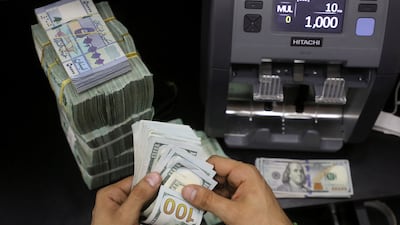President Joe Biden and House Republicans are currently deadlocked over the possibility of raising the debt ceiling, drawing the US closer to a potential default, which would have global consequences.
If the crisis is not resolved within the next 10 days, the US could fall headlong into a recession – but the American economy would not be the only one affected.
Here's how a US debt default would affect the Middle East.
What impact would a US debt default have on the Mena region?
Saudi Arabia, the UAE, Bahrain, Iraq, Oman, Kuwait and Qatar all hold significant sums in US treasuries and would see massive contractions in their financial markets.
Others with large debt finance, such as Egypt and Lebanon, would also be hit hard.
The US also plays a critical role in the geographic distribution of assets in the sovereign wealth fund portfolios of oil- and gas-producing countries in the Middle East, according to experts.
So, if the stock prices of publicly listed US companies or the values of other assets plunge, these regional sovereign wealth funds will feel the pain.
What would happen to the value of the US dollar?
A US default is likely to wreak havoc on financial markets across the Middle East.
The US dollar has, since the end of the Second World War, been the world's top choice for currency reserves held by central banks and foreign institutions – and those in the Middle East are no exception.
More than half the world's currency reserves are held in US dollars and the currency has long been considered one of the world's most secure assets.
Any hit to confidence in the US economy due to a default or uncertainty would cause investors to sell US treasury bonds, which would, in turn, weaken the dollar.
What would happen to the price of oil?
Oil prices would be affected as part of a broader precipitation of a global economic slowdown that will push prices down, experts say.
Already on Monday, crude oil prices fell amid ongoing concerns about the continued deadlock in negotiations.
“The debt ceiling and/or an actual default would set the stage for a longer-term economic downturn, where you have persistently low-energy prices for the foreseeable future in a poor macroeconomic environment,” Robert Mogielnicki, senior resident scholar at the Arab Gulf States Institute in Washington, told The National.
“That combination is going to be a really tricky situation to turn into something positive on the domestic front for these governments.”
What would happen to more fragile Mena economies?
A weakened US dollar would make payments more expensive for low-income countries that are already struggling with debt, as well as create new global and geopolitical uncertainty.
“It would make the job that they nations need to do – fiscal reforms and other steps to either stabilise their economies or make them more sustainable – even harder to do,” Mr Mogielnicki said.
The impact would be heavily felt in Egypt and Lebanon, in particular, as well as countries in North Africa.
Could Mena start to rely more on the Chinese yuan?
Mr Mogielnicki said that a major change in value of the US dollar would drive debates in Gulf Co-operation Council countries over de-dollarisation, or reducing reliance on the greenback as a reserve currency and medium of exchange.
Despite weakening exports from China to western countries, the yuan has been gaining more importance in international trade amid growth of its share of global trade settlement currency.
“It would add fuel to the fire to ongoing conversations about de-dollarisation,” Mr Mogielnicki said.
“This type of event in Washington would vindicate the position in favour of advocating for seeking a strategy to engage with other currencies in the global system.”


